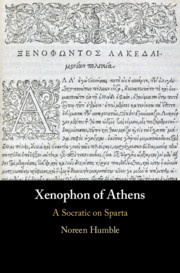Description
Xenophon of Athens
A Socratic on Sparta
Author: Humble Noreen
Challenges the long-held view that Xenophon is pro-Spartan, arguing that his stance is, rather, critical and philosophical.
Language: EnglishApproximative price 36.76 €
In Print (Delivery period: 14 days).
Add to cart
Xenophon of Athens
Publication date: 03-2023
Support: Print on demand
Publication date: 03-2023
Support: Print on demand
Approximative price 115.29 €
In Print (Delivery period: 14 days).
Add to cart
Xenophon of Athens
Publication date: 12-2021
380 p. · 15.7x23.6 cm · Hardback
Publication date: 12-2021
380 p. · 15.7x23.6 cm · Hardback
Description
/li>Contents
/li>Biography
/li>
Xenophon of Athens (c. 430?354 BCE) has long been considered an uncritical admirer of Sparta who hero-worships the Spartan King Agesilaus and eulogises Spartan practices in his Lacedaimoniôn Politeia. By examining his own self-descriptions - especially where he portrays himself as conversing with Socrates and falling short in his appreciation of Socrates' advice - this book finds in Xenophon's overall writing project a Socratic response to his exile and situates his writings about Sparta within this framework. It presents a detailed reading of the Lacedaimoniôn Politeia as a critical and philosophical examination of Spartan socio-cultural practices. Evidence from his own Hellenica, Anabasis and Agesilaus is shown to confirm Xenophon's analysis of the weaknesses in the Spartan system, and that he is not enamoured of Agesilaus. Finally, a comparison with contemporary Athenian responses to Sparta, shows remarkable points of convergence with his fellow Socratic Plato, as well as connections with Isocrates too.
Preface; List of Abbreviations; Note on Spelling Conventions; Introduction; Part I. 1. Xenophon and his Literary Project; 2. The Lacedaimoniôn Politeia: Theories, Problems, Assumptions; Part II. 3. Reading Lacedaimoniôn Politeia 1-4; 4. Reading Lacedaimoniôn Politeia 5-10; 5. Reading Lacedaimoniôn Politeia 11-15; Part III. 6. The Place of the Lacedaimoniôn Politeia within Xenophon's Literary Project; 7. Xenophon, Plato and Isocrates; Conclusion; Appendix: Text and Translation of the Lacedaimoniôn Politeia; Bibliography; Index locorum; General Index.
Noreen Humble is a Professor in the Department of Classics at the University of Calgary. She has published numerous articles about Xenophon and the reception of Xenophon and Plutarch in Byzantium and the Renaissance, and is the editor of Plutarch's Lives: Parallelism and Purpose (2010), and co-editor (with P. Crowley and S. Ross) of Mediterranean Travels: Writing Self and Other (2011).
© 2024 LAVOISIER S.A.S.





